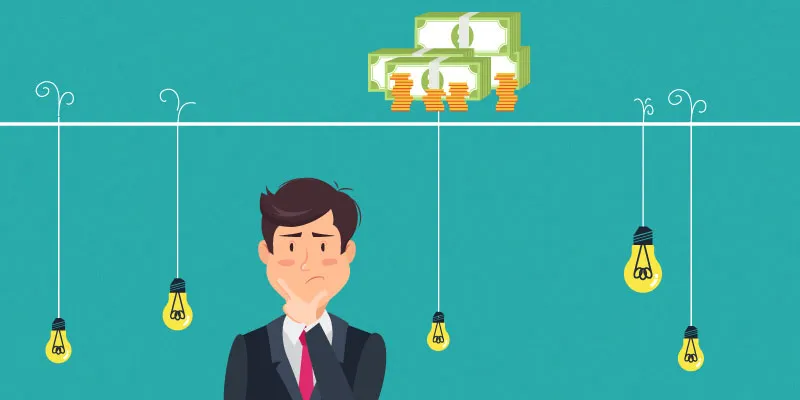The 100 rules for being an entrepreneur
If you Google "entrepreneur" you get a lot of mindless cliches like "Think Big!"
For me, being an “entrepreneur” doesn’t mean starting the next “Facebook”. Or even starting any business at all.
It means finding the challenges you have in your life, and determining creative ways to overcome those challenges...
I believe that creating multiple income streams is important for everyone. However, in this post I focus mostly on the issues that come up when you first start an actual company.

These rules also apply if you are taking an entrepreneurial stance within a much larger company (which all employees should do).
Just as good to be an "entreployee" as an "entrepreneur". Either one will help you survive this world of increased economic uncertainty.
For me, I’ve started several businesses.
Maybe 17 have failed out of 20. I fail quickly. I fail frequently. Entrepreneurship is a sentence of failures punctuated by brief success.
I'm invested in about 28 private companies. I've advised probably another 50 private companies. I'm on the board of several private companies and one public company. The companies ranging from $0 in revenues to a billion in revenues.
Along the way I’ve compiled a list of rules that have helped me deal with every aspect of being an entrepreneur in business and some in life.
Here are the real rules:
A) It’s not fun.I’m not going to explain why it’s not fun. These are rules. Not theories. I don’t need to prove them.
But there’s a strong chance you can hate yourself throughout the process of being an entrepreneur. Keep sharp objects and pills away during your worst moments. And you will have them. If you are an entrepreneur and agree with me, please note this in the comments below.
B) Try not to hire people.You’ll have to hire people to expand your business. But it’s a good discipline to really question if you need each and every hire.
C) Get a customer. This seems obvious. But it’s not. Get a customer before you start your business, if you can.
So many people say to me, "I have an idea. Can you introduce me to VCs?"
There is a HUGE gap between "idea" and "professional venture capital".
In the middle of that gap is "customer".
D) If you are offering a service, call it a product.
Oracle did it. They claimed they had a database. But if you “bought” their database they would send in a team of consultants to help you “install” the database to fit your needs.
In other words, for the first several years of their existence, they claimed to have a product but they really were a consulting company. Don’t forget this story. Products are valued higher than services.
And almost EVERY major software product company was a service company in the beginning. Don't forget that.
E) It’s OK to fail.Start over. Hopefully before you run out of money. Hopefully before you take in investor money. Or, don't worry about it. Come up with new ideas. Start over.
F) Be profitable. Try to be profitable immediately. This seems obvious but it isn’t. Try not to raise money. That money is expensive.
G) When raising money: if it’s not easy then your idea is probably incapable of raising money. If its easy, then take as much as possible. If its TOO easy, then sell your company (unless you are Twitter, etc).
(if its too easy, sell your company)
H) The same goes for selling your company. If it’s not easy, then you need to build more. Then sell. To sell your company, start getting in front of your acquirers a year in advance. Send them monthly updatesdescribing your progress. Then, when they need a company like yours, your company is the first one that comes to mind.
Don't be like that guy in the TV show "Silicon Valley". If someone offers you ten million for a company that has no revenues, then sell it.
Not everything is going to be a Facebook. And even the Google guys tried to sell their company for ONE MILLION DOLLARS to Yahoo before they were revenue positive.
SELL THE COMPANY.
I) Competition is good. It turns you into a killer. It helps you judge progress. It shows that other people value the space you are in. Your competitors are also your potential acquirers.
J) Don’t use a PR firm.Except maybe as a secretary. You are the PR for your company. You are your company's brand. You personally.
I've never had a good PR company. I've had good PR secretaries. But they are cheaper. One time I hired a PR company and they accidentally sent me the contract for Terry Bradshaw. He was paying $10,000 a month. How did they do for him?
K) Communicate with everyone. Employees. Customers. Investors. All the time. Every day.
Employees want to know what to do. And they want to know you are thinking of their overall career.
Customers want to know how to keep their bosses calm.
Investors want to be your friend and want to know they can count on you when time's are tough.
L) Do everything for your customers. This is very important.
Get them girlfriends or boyfriends. Speak at their charities. Visit their parents for Thanksgiving. Help them find other firms to meet their needs. Even introduce them to your competitors if you think a competitor can help them or if you think you are about to be fired. Always think first, “What’s going to make my customer happy?”
Note: EVEN if that means introduce them to a competitor. If you are the SOURCE, then everybody comes back to the source.
M) Your customer is not a company. There’s a human there. What will make my human customer happy? Make him laugh. You want your customer to be happy.
N) Show up. Go to breakfast/lunch/dinner with customers. Treat.
O) History. Know the history of your customers in every way. Company history, personal history, marketing history, investing history, etc.
P) Micro-manage software development. Nobody knows your product better than you do. If you aren’t a technical person, learn how to be very specific in your product specification so that your programmers can’t say: “well you didn’t say that!”
Q) Hire local. You need to be able to see and talk to your programmers. Don’t outsource to India. I love India. But I won't hire programmers from there while I'm living in the US.
R) Sleep. Don’t buy into the 20 hours a day entrepreneur myth. You need to sleep 8 hours a day to have a focused mind.
If you are working 20 hours a day, then that means you have flaws in how you are managing your time. You can argue about this but it's true.
S) Exercise. Same as above. If you are unhealthy, your product will be unhealthy.
T) Emotionally DON'T have dating problems and software development problems at the same time. VCs will smell this all over you.
U) Pray. You need to. Be grateful where you are. And pray for success. You deserve it. Pray for the success of your customers. Heck, pray for the success of your competitors. The better they do, it means the market is getting bigger. And if one of them breaks out, they can buy you.
V) Buy your employees gifts. Tickets. Whatever. I always imagined that at the end of each day my young, lesbian employees (for some reason, most employees at my first company were lesbian) would be calling their parents and their mom and dad would ask them: “Hi honey! How was your day today?” And I wanted them to be able to say: “It was the best!” Invite customers to masseuse day.
W) Treat your employees like they are your children.They need boundaries. They need to be told “no!” sometimes. And sometimes you need to hit them in the face (ha ha, just kidding). But within boundaries, let them play.
X) Don’t be greedypricing your product. If your product is good and you price it cheap, people will buy. Then you can price upgrades, future products, and future services more expensive. Which goes along with the next rule.
Y) Distribution is everything. Branding is everything. Get your name out there, whatever it takes. The best distribution is of course word of mouth, which is why your initial pricing doesn’t matter.
Write a blog about your industry and be very honest about all the flaws (even your own) that is currently in your industry.
Authenticity is the best branding.
Z) Don’t kill yourself.It’s not worth it. Your employees need you.
Your children or future children need you. It seems odd to include this in a post about entrepreneurship but we’re also taking about keeping it real.
Most books or “rules” for entrepreneurs talk about things like “think big”, “go after your dreams”. But often dreams turn into nightmares. I’ll repeat it again. Don’t kill yourself. Call me if things get too stressful. Or more importantly, make sure you take proper medication
AA) Give employees structure.Let each employee know how his or her path to success can be achieved. All of them will either leave you or replace you eventually. That’s OK. Give them the guidelines how that might happen. Tell them how they can get rich by working for you.
BB) Fire employees immediately. If an employee gets “the disease” he needs to be fired. If they ask for more money all the time. If they bad mouth you to other employees. If you even think they are talking behind your back, fire them.
The disease has no cure. And it’s very contagious. Show no mercy. Show the employee the door. There are no second chances because the disease is incurable.
I don't say this because I want anyone to be hurt. But if you've followed the rules above then you are treating employees well already. NOBODY should spread the disease and badmouth you or your customers.
CC) Make friends with your landlord. If you ever have to sell your company, believe it or not, you are going to need his signature (because there’s going to be a new lease owner)
DD) Only move offices if you are so packed in that employees are sharing desks and there’s no room for people to walk.
EE) Have killer parties. But use your personal money. Not company money. Invite employees, customers, and investors. It’s not the worst thing in the world to also invite off duty prostitutes or models.
I don't say this in a sexist way. It's just the reality of what happens with every company in the world.
FF) If an employee comes to you crying, close the door or take him or her out of the building. Sit with him until it stops. Listen to what he has to say. If someone is crying then there’s been a major communication breakdown somewhere in the company. Listen to what it is and fix it. Don’t get angry at the culprit’s. Just fix the problem.

(you don't want your employees to be sad.)
GG) At Christmas, donate money to every customer’s favorite charity. But not for investors or employees.
HH) Have lunch with your competitors. Listen and try not to talk. One competitor (Bill Markel from Interactive 8) once told me a story about how the CEO of Toys R Us returned his call. He was telling me this because I never returned Bill's calls. Ok, Bill, lesson noted.
II) Ask advice a lot.Ask your customers advice on how you can be introduced into other parts of their company. Then they will help you. Because of the next rule...
JJ) Hire your customers.Or not. But always leave open the possibility. Let it always dangle in the air between you and them. They can get rich with you. Maybe. Possibly. If they play along. So play.
KK) On any demo or delivery, do one extra surprise thing that was not expected. Always add bells and whistles that the customer didn’t pay for.
This is such an easy way to over deliver I'm surprised people don't do it 100% of the time. They do it maybe 1% of the time. So this is an easy way to compete and surprise and delight.
LL) Understand the demographicchanges that are changing the world. Where are marketing dollars flowing and can you be in the middle. What services do aging baby boomers need? Is the world running out of clean water? Are newspapers going to survive? Etc. Etc. Read every day to understand what is going on.
LLa) Don't go to a lot of parties or "meetups" with other entrepreneurs. Work instead while they are partying.
MM) But, going along with the above rule, don’t listen to the doom and gloomers that are hogging the TV screen trying to tell you the world is over. They just want you to be scared so they can scoop up all the money.
NN) You have no more free time.In your free time you are thinking of new ideas for customers, new ideas for services to offer, new products.
OO) You have no more free time, part In your free time, think of ideas for potential customers. Then send them emails: “I have 10 ideas for you. Would really like to show them to you. I think you will be blown away. Here’s five of them right now.”
OOa) Depressions, recessions, don't matter. There's $15 trillion in the economy. You're allowed a piece of it:

FedEx, Microsoft, HewlettPackard, and many huge companies were started in recessions or depressions. Leave economics to the academics while they leave good business to you.
PP) Talk. Tell everyone you ever knew what your company does. Your friends will help you find clients.
QQ) Always take someone with you to a meeting. You’re bad at following up. Because you have no free time. So, if you have another employee. Let them follow up. Plus, they will like to spend time with the boss. You're going to be a mentor.
RR) If you are consumer focused: your advertisers are your customers. But always be thinking of new services for your consumers. Each new service has to make their life better. People’s lives are better if: they become healthier, richer, or have more sex. “Health” can be broadly defined.
SS) If your customers are advertisers:find sponsorship opportunities for them that drive customers straight into their arms. These are the most lucrative ad deals (see rule above). Ad inventory is a horrible business model. Sponsorships are better. Then you are talking to your customer.
TT) No friction. The harder it is for a consumer to sign up, the less consumers you will have. No confirmation emails, sign up forms, etc. The easier the better.
TTA) No fiction, part 2. If you are making a website, have as much content as you can on the front page. You don't want people to have to click to a second or third page if you can avoid it. Stuff that first page with content. You aren't Google. (And, 10 Unusual Things You Didn't Know About Google)
UU) No friction, part 3. Say “yes” to any opportunity that gets you in a room with a big decision maker. Doesn’t matter if it costs you money.
VV) Sell your companytwo years before you sell it. Get in the offices of the potential buyers of your company and start updating them on your progress every month. Ask their advice on a regular basis in the guise of just an “industry catch-up”
WW) If you sell your companyfor stock, sell the stock as soon as you can. If you are selling your company for stock it means:
- a. The market is such that lots of companies are being sold for stock.
- b. AND, companies are using stock to buy other companies because they value their stock less than they value cash.
- c. WHICH MEANS, that when everyone’s lockup period ends, EVERYONE will be selling stock across the country. So sell yours first.
XX) Execution is a dime a dozen.If you have an idea worth pursuing, then just make it. You can build any website for cheap. Hire a programmer and make a demo. Get at least one person to sign up and use your service. If you want to make Facebook pages for plumbers, find one plumber who will give you $10 to make his Facebook page. Just do it.
Fail quickly. Good ideas are HARD. It's execution that is a dime a dozen.
YY) Don’t use a PR firm, part II. Set up a blog. Tell your personal stories (see “33 tips to being a better writer”). Let the customer know you are human, approachable, and have a real vision as to why they need to use you. Become the voice for your industry, the advocate for your products. If you make skin care products, tell your customers every day how they can be even more beautiful than they currently are and have more sex than they are currently getting. Blog your way to PR success. Be honest and bloody.
ZZ) Don’t save the world.If your product sounds too good to be true, then you are a liar.
ZZa) Your company is always for sale.

AAA) Frame the first check. I’m staring at mine right now.
BBB) No free time, part 3. Pick a random customer. Find five ideas for them that have nothing to do with your business. Call them and say, “I’ve been thinking about you. Have you tried this?”
CCC) No resale deals. Nobody cares about reselling your service. Those are always bad deals.
DDD) Your lawyer or accountant is not going to introduce you to any of their other clients. Those meetings are always a waste of time.
EEE) Celebrate every success. Your employees need it. They need a massage also. Get a professional masseuse in every Friday afternoon. Nobody leaves a job where there is a masseuse.
FFF) Sell your first company. I have to repeat this. Don’t take any chances. You don’t need to be Mark Zuckerberg. Sell your first company as quick as you can. You now have money in the bank and a notch on your belt. Make a billion on your next company.
Note Mark Cuban's story. Before he started Broadcast.com and rode it to a few billion, he sold his first software company for ten million.
GGG) Pay your employees before you pay yourself.
HHH) Give equity to get the first customer. If you have no product yet and no money, then give equity to a good partner in exchange for them being a paying customer. Note: don’t blindly give equity. If you develop a product that someone asked for, don’t give them equity. Sell it to them. But if you want to get a big distribution partner whose funds can keep you going forever, then give equity to nail the deal.
III) Don’t worry about anyone stealing your ideas. Ideas are worthless anyway. It’s OK to steal something that’s worthless.
IIIA) Follow me on twitter.
Questions from Readers
Question: You say no free time but you also say keep emotionally fit, physically fit, etc. How do I do this if I’m constantly thinking of ideas for old and potential customers?
Answer: It’s not easy or everyone would be rich.
Question: if I get really stressed about clients paying, how do I get sleep at night?
Answer: Medication
Question: how do I cold-call clients?
Answer: email them. Email 40 of them. It’s OK if only 1 answers. Email 40 a day but make sure you have something of value to offer.
Question: how can I find cheap programmers or designers?
Answer: if you don’t know any and you want to be cheap: use scriptlance.com, elance.com, or craigslist. But don’t hire them if they are from another country. You need to communicate with them even if it costs more money.
Question: should I hire programmers?
Answer: first…freelance. Then hire.
Question: what if I build my product but I’m not getting customers?
Answer: develop a service loosely based on your product and offer that to customers. But I hope you didn’t make a product without talking to customers to begin with?
Question: I have the best idea in the world, but for it to work it requires a lot of people to already be using it. Like Twitter.
Answer: if you’re not baked into the Silicon Valley ecosystem, then find distribution and offer equity if you have to. Zuckerberg had Harvard. MySpace had the fans of all the local bands they set up with MySpace pages. I (in my own small way) had Thestreet.com when I set up Stockpickr.com. I also had 10 paying clients when i did my first successful business fulltime.
Question: I just lost my biggest customer and now I have to fire people. I’ve never done this before. How do I do it?
Answer: one on meetings. Be Kind. State the facts. Say you have to let people go and that everyone is hurting but you want to keep in touch because they are a great employee. It was an honor to work with them and when business comes back you hope you can convince them come back. Then ask them if they have any questions. Your reputation and the reputation of your company are on the line here. You want to be a good guy. But you want them out of your office within 15 minutes. It’s a termination, not a negotiation. This is one reason why it’s good to start with freelancers.
Question: I have a great idea. How do I attract VCs?
Answer: build the product. Get a customer. Get money from customer. Get more customers. Build more services in the product. Get VC. Chances are by this point, the VCs are calling you.
Question: I want to build a business day trading.
Answer: bad idea
Question: I want to start a business but don’t know what my passion is:
Answer: skip to the post: “How to be the luckiest person alive”. Do the Daily Practice. Within six months your life will be completely different.
Question: I want to leave my job but I’m scared.
Answer: same as above question. The Daily Practice turns you into a healthy Idea Machine. Plus luck will flow in from every direction.
Final rule: Things change. Every day. The title of this post, for instance, says “100 Rules”. But I gave about 70 rules (including the Q&A). Things change midway through. Be ready for it every day. In fact, every day figure out what you can change just slightly to shake things up and improve your product and company.
Your business is not your life. When you start a business you also get a cognitive bias that makes you think your business is GREAT.
Every day make sure you are not smoking crack. The most important thing is your health so you can be persistent. If you smoke crack you can die.
I hope you succeed. Because I really need that smart toilet that sends my doctors text messages after doing urinalysis on my pee every day.
Good luck.
(Disclaimer: The views and opinions expressed in this article are those of the author and do not necessarily reflect the views of YourStory.)







